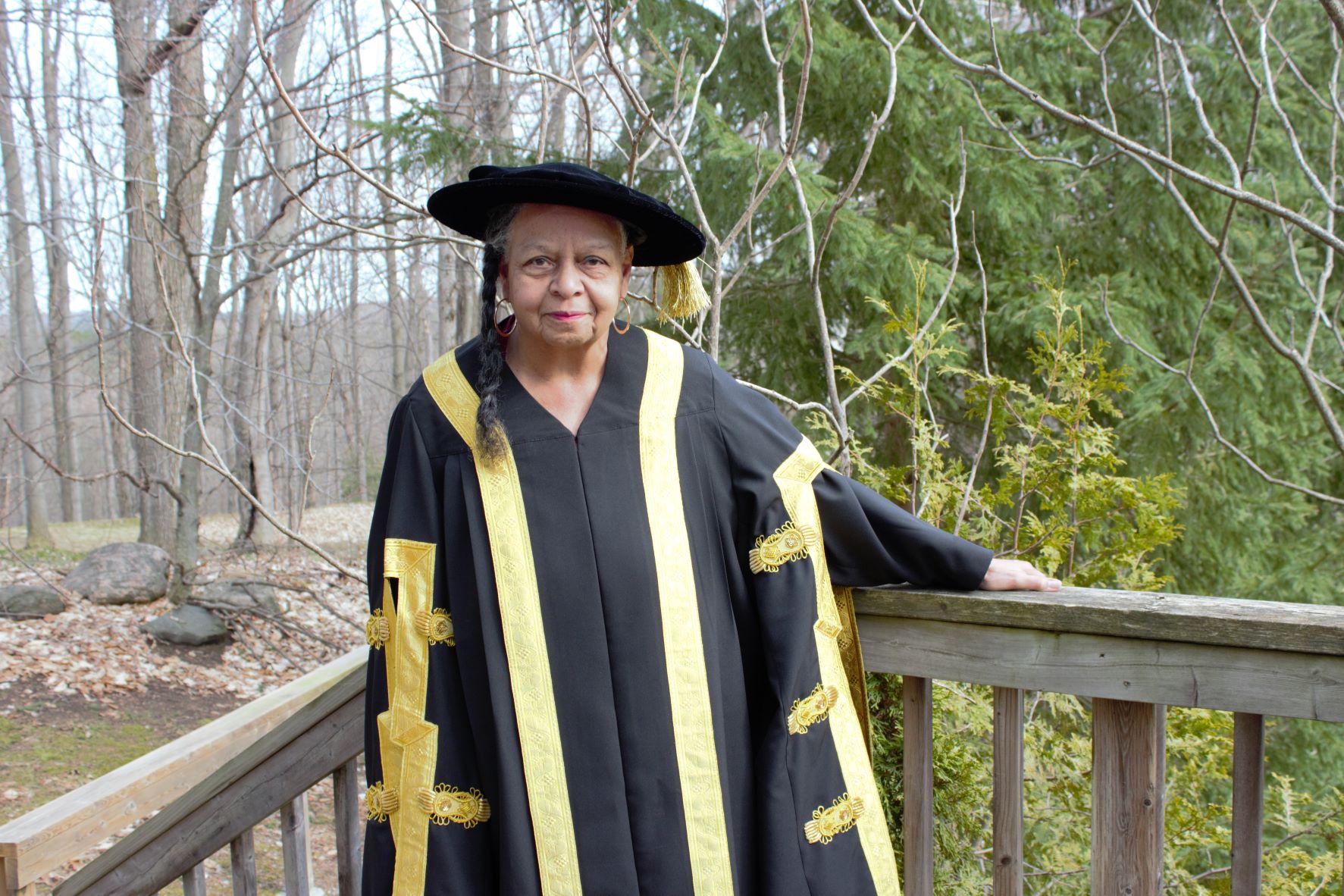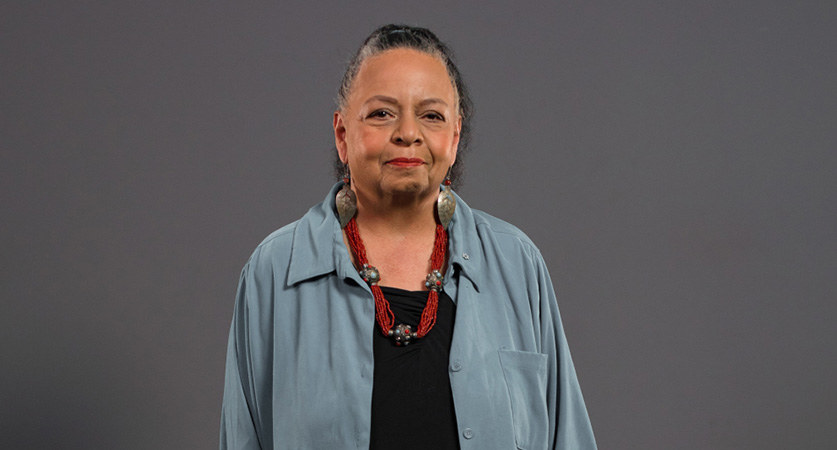Dr. Rita Shelton Deverell has overcome seemingly insurmountable hurdles and her courageousness has made Canada a more welcoming and compassionate place.
She's an educator, journalist, theatre artist, social activist, television producer and director, and a Member of the Order of Canada. In May 2022, Dr. Deverell achieved one more historic milestone when she became the first Black Canadian to serve as the chancellor of Lakehead University.
The chancellor, as the titular head of the University, confers degrees to all graduating students, but also serves as an ambassador for the University, participating in outreach and other initiatives.
"I was very honoured to be asked," Dr. Deverell says. "It's a symbolic role, but symbols are powerful."
It didn't strike me as odd that a Greek tragedy would have an all-Black cast. I saw the Black Antigone and thought 'This is what I want to do.'
Her association with Lakehead began before she became chancellor.
She'd been teaching education courses at the Orillia campus for several years and delivering Equity, Diversity, and Inclusion (EDI) training to Lakehead students. Moreover, she is part of the team under the leadership of Dr. Cynthia Wesley-Esquimaux, Chair on Truth and Reconciliation, creating an online training module for Lakehead faculty and staff.
"Lakehead, because of its unique geographic location and this moment in history," Dr. Deverell says, "is positioned to be a real leader in solving urgent challenges that are also a priority for me, including Truth and Reconciliation, EDI, and health care."
In addition, she's keen to defend and strengthen Canada's schools.
"I don't want to see us go the way of the United States where middle-class people are bailing out of the public school system, that's why Lakehead's Faculty of Education is important to the health of our schools."
First and foremost, though, Dr. Deverell sees herself as an artist.
"My primary work is supporting arts-based methodologies and research. The arts foster the wellbeing of society because they're ultimately about what is healing."
The arts became vital to Dr. Deverell's identity at a young age.
"After seeing a production of Antigone at my local community centre when I was eight years old, I decided to be an actor. The play had a kind of clarity that felt life changing. This was in Houston before the civil rights movement, when everything was still segregated, so they had an all-Black staff and performers. It didn't strike me as odd that a Greek tragedy would have an all-Black cast. I saw the Black Antigone and thought 'This is what I want to do.'"
She graduated from Adelphi University in 1966 with a BA in Philosophy and then earned an MA in the History of Religions from Columbia University/Union Theological Seminary in New York. Dr. Deverell met her husband there—a theological student from Canada whose hometown happened to be Orillia.
"We found that we were both interested in the intersection of arts and religions," Dr. Deverell says.

Dr. Deverell's impact has been recognized with many honours including receiving the Governor General's Performing Arts Lifetime Achievement Award for Broadcasting in 2022, being named the 2018 "Woman of the Year" by the Alliance of Canadian Cinema, Television and Radio Artists (ACTRA), and being inducted into the Canadian Association of Broadcasters (CAB) Hall of Fame in 2002.
Despite her degrees and artistic talent, she soon ran into roadblocks.
"Racism has been a defining aspect of my career. I've faced many slammed doors and glass ceilings. But when something became impossible, I'd turn to another field where a door had opened. On the bright side, being forced to change directions revealed talents I didn't know I had."
Around 1972, a four-month research contract with the Religious Television Associates—a partnership of United, Anglican, Catholic, Lutheran, Presbyterian, and Baptist churches that wanted better quality TV programming for older children—morphed into a contract to produce a children's television show, which ultimately became the innovative All in a Tube program.
From there, Dr. Deverell would go on to produce and host current affairs shows at CBC, such as Regina Noon and CBC Access, before joining the University of Regina as a journalism professor in 1983, while simultaneously completing her Doctorate in Education at the Ontario Institute for Studies in Education/University of Toronto.
I didn't wake up one day and decide to be a social activist—all I've done is remove the barriers for somebody like me and mentor people, and that has meant social activism.
Religions plays a central role in her work—she's one of the founders of the multi-faith Vision TV network.
"The healing created by having multi-faith cooperation is needed now more than when Vision was founded in 1988. We're living in an era of dangerous fake news and some of its misinformation is centred upon religions and faith."
She realized this in the wake of 9/11 when she was a visiting scholar at New York University, which is located in lower Manhattan where the Twin Trade Towers stood. This period marked the start of increased Islamophobia.
"The faculty was traumatized and many of the students were still homeless when I arrived," Dr. Deverell says. "All of a sudden there was a renewed call for religious peace coalitions that had been strong in the 1960s."
At Vision TV, she was a vice-president and hosted and produced award-winning shows like Arts Express and It's About Time. Dr. Deverell left the network in 2002 and the opportunity arose to be the news director at the fledgling Aboriginal Peoples Television Network (APTN) in Winnipeg.
"It was irresistible to work for the world's first Indigenous news service because I'd been dealing with Indigenous issues in media for a long time. It was a sunset contract so during the three-year period I held the position, I mentored Indigenous successors."
Dr. Deverell is still connected to the broadcasting field. She's a current member of CBC's board of directors, something that's allowed her to witness its evolution into an institution that's more representative and inclusive of all Canadians. She's seeing a similar shift at the Royal Ontario Museum (ROM), where she served as a trustee until February 2023, and has written a chapter about the problematic and controversial 1989 Out of Africa exhibition and the Museum's belated work to repair its relationship with Black communities, for ROM's book Making History: Visual Arts and Blackness in Canada.
"Changing legacy institutions is extremely difficult," Dr. Deverell says, "it's like turning the Queen Mary ocean liner around. It's the kind of work I'm sometimes positioned to do, but it's not for everyone."
Her career in the arts, education, and broadcast industries have earned her the title of social activist, but Dr. Deverell says that it wasn't a conscious choice.
"I didn't wake up one day and decide to be a social activist—all I've done is remove the barriers for somebody like me and mentor people, and that has meant social activism."


